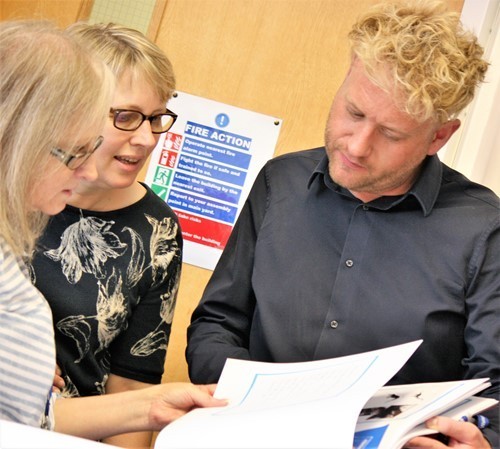“Children are excited about learning and teachers are enthusiastic about teaching”, is not the everyday comment you hear about the current education system, but that’s the view of a Head Teacher who is the first in the UK to implement a brand-new global curriculum into his school.
Head teacher Mark Hamblett has introduced Dimension’s ‘Learning Means The World’ (LMTW) Curriculum at his Blackpool school in Lancashire, which has enabled his pupils to engage with, tackle and learn about challenging and inspiring 21st Century issues – including world conservation and climate change.
The forward-thinking LMTW curriculum is written outside the constraints of the National Curriculum – although providing more than 85% coverage - and was the brain child of curriculum pioneer and founder of Dimensions Curriculum, Elaine Sutton, herself a former teacher and educational consultant.
World issues are at the forefront of the curriculum, centred around 4Cs of Communication, Conflict, Conservation and Culture. Not only does it ensure that young people have the opportunity to tackle and gain heightened awareness on interesting topics linked to current world issues, but it also takes time-consuming lesson planning out of the teaching equation, significantly reducing pupil workload.
Almost one thousand schools across the globe, 950 based in the UK, have already taken up her company’s forward-thinking curriculums – which include 3D PHSE and the Dimensions Primary Thematic Curriculum – and now there’s been an outpouring of interest in the LMTW programme, which includes an entire strand dedicated to conservation, as opposed to merely seasons, weather patterns and the water cycle currently required by the National Curriculum.
Waterloo Academy head teacher, Mr Hamblett, who had previous utilised the original Dimensions Primary Thematic Curriculum in his former school, says: “When I arrived in this post, the school was using a curriculum that had been written 10 years earlier and had been tweaked each year to reflect changes in the National Curriculum.
“It just wasn’t fit for purpose anymore. It was not personalised for our children. It allowed inequality from class to class and teacher to teacher. So, we took a brave leap not to just follow the National Curriculum.
“When we heard about Learning Means the World, we wanted to jump in with both feet – we knew it was perfect for us.”
He introduced the new curriculum, together with mixed ability classes to make the school all-inclusive in January 2019, and, along with seeing attendance levels soar and staff workload plummet, he adds: “It’s had a massive, positive impact on teaching and learning.
“Children are excited about learning and teachers are enthusiastic about teaching – it has reignited everyone’s passion. By using a curriculum that is relevant to the 21st Century, we have changed the culture of learning to one that inspires and motivates.
From the LMTW Curriculum, all pupils – from Early Years to Year 6 – have just finished age-relevant learning on the conservation topic and, where in the past this might have been limited to surface level knowledge, pupils have tackled tougher issues such as the social and economic impact, which Mr Hamblett says is “crucial knowledge for their future”.
There was concern from staff initially before the LMTW roll-out, Mr Hamblett admits, although any panic was short-lived.
“There was worry about stats and some staff were concerned that it would knock the creativity out of them or that their workload would increase because they would have to start from scratch.
“But, the great benefit of the programme is that it has guidelines of what to do, but not how to do it and swiftly staff realised that there was no need for concern and that they actually have more room for creativity and freedom within this curriculum.
“The feedback from staff has been brilliant. They enjoy it because it’s already planned, they just personalise it and concentrate on the delivery because the hard work has already been done for them.”
Year 3 teacher Claire Harrop, who has been teaching at Waterloo Road for 25 years, has been re-invigorated by the new approach.
“Bringing English, Maths and topic work all together is a great way to teach and it has been so interesting to learn and research new topics. It has not been hard work and the workload is a lot less,” she says.
“The difference from before we introduced LMTW is that the children are mega enthusiastic! They want to do practical hands-on things at home as part of the topic. Very often children didn’t do homework, but they are all bubbling with excitement to do it because it the learning is so interesting and relevant.”
Evidence of each child’s learning goes into their own personal learning journey, which Mrs Harrop says the children are “very proud of”.
“They want it to look great and so work hard on their handwriting and presentation, more than they did before. This curriculum has had a massive positive impact in the classroom.”
After spending 16 years as a teacher and then as a curriculum consultant and advisor for Blackburn with Darwen Local Authority, Elaine Sutton’s vision was for a curriculum that was vibrant, challenging and engaging, designed to enthuse teachers and motivate pupils to want to learn more.
Dimensions now has three whole school curriculums – LMTW, Dimensions Primary Curriculum and Dimensions Primary Curriculum for Northern Ireland – with around five hundred schools in the UK having taken up either the entire curriculum offer or partial programmes to comply with the National Curriculum.
“This curriculum is far from an off-the-shelf model. We help schools take ownership and personalise the curriculum to suit their pupils’ needs, getting alongside staff and working in partnership with senior leaders. With the new Ofsted focus on curriculum, schools are finding this to be the perfect solution to the arduous task of curriculum re-design.”
Last month, Labour vowed to make climate change a core part of the primary school curriculum if it gained power.
Says Elaine: “We’ve already done this because we believe that all young people should be educated about the ecological and social impact of climate. Schools want their pupils to learn about issues that are relevant and so we also have conflict and culture as core issues within our curriculum. Our strapline for the LMTW Curriculum is ‘dealing with tomorrow’s issues today’ and that’s exactly what this curriculum does.”
Among the latest schools to take up the LMTW curriculum is Ballifield Primary School in Sheffield. Head teacher, Amanda Smith, is currently phasing in LMTW and comments that after just one half-term that the enthusiasm for learning and the wealth of knowledge of the pupils was “tremendous”.
She adds: “With the help from Elaine, we have mapped our curriculum to give staff a flavour of the themes before we launch officially in September, but already we have seen children really enjoying learning and wanting to go home and learn more and we can’t wait to fully implement this curriculum.
“It has significantly reduced the workload of staff, the resources are so high quality, and it has the flexibility for staff to decide how to timetable and organise or add in their own elements.”























